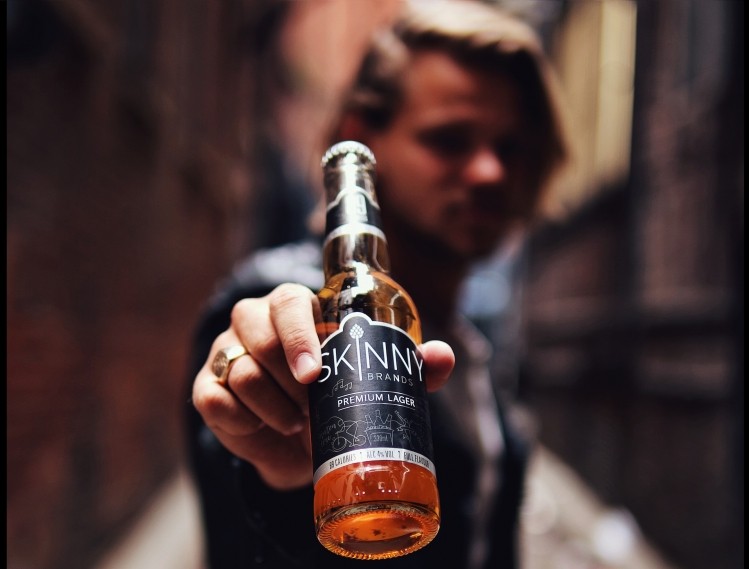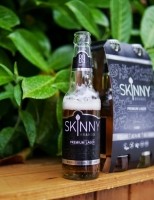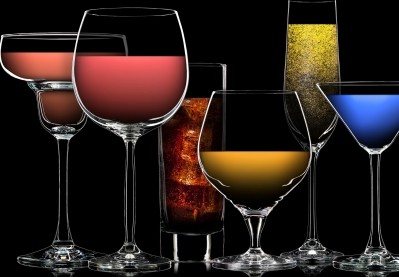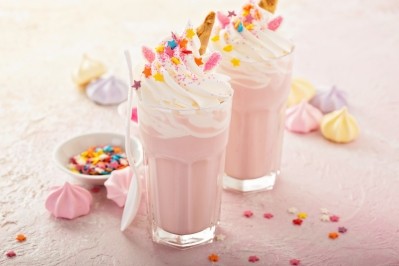Skinny Brands reduces calories - not ABV - with its lager

Skinny Brands’ flagship product is a 4% ABV lager with 35% fewer calories. It also offers lower calorie cider and cocktails.
While low and no alcohol products have been creating a lot of noise in the UK market place, Skinny Brands sees the real opportunity lying in products with a reduced calorie count.
‘The market is focused on 0%, which is bonkers’
The UK company was created in 2015 by Tom Bell and Gary Conway – Bell had spent several years researching lower calorie alternatives, while Conway’s experience includes roles with Corona and pubs.
“The market has shifted over the last five years, and it’s been an incredible change with health and wellness being huge reasons for consumer to curb their drinking habits,” said Bell. “Young and conscious drinkers are reducing how much they drink, or changing the products they drink to healthier versions, and the industry has been slow to change.”
Momentum behind low and no alcohol products is now gathering pace in the UK: but Bell is not convinced that this will ultimately be a winner with health-conscious drinkers. He questions whether drinkers really want to give up alcohol – while says the among of sugar in some no and low alcohol drinks means they are not as ‘healthy’ as consumers believe.
“The market is focused on 0%, which to me is a bonkers and misleading concept as while abstainers are on the increase, the overwhelming majority want a better product - not to stop drinking all together,” he said.
Skinny Brands estimates its lager contains 35% fewer calories than other premium lagers on the market, coming in at 89 calories per 330ml bottle with 1.3g sugar and 3g carbs. It is also gluten-free and vegan.
“It took over a year to refine the recipe and get the product to a point where we were delivering everything consumers want and nothing they don’t – along with delivering the best tasting lager possible," said Bell.
“The refining took a considerable amount of test brews and recipe changes – we had to develop a method of reducing calories, filtering gluten and all in a vegan process without affecting ABV and quality.”
The resulting brew has an IBU (index of bitterness units) of 14 – comparable to Corona and Sol.
“We do not taste like a ‘light beer’ but do have less carbonation, which is on purpose (nobody likes to be bloated). Most ‘light beers’ have an IBU of 8-11 so we are by far a much stronger and premium lager than those.”
‘We understand why consumers have switched off beer’
In its first two years, Skinny Lager produced over two million bottles and now ships its products to Norway, Italy, Ireland, Israel, Russia, Dubai and the United Arab Emirates.
While Bell agrees that the no/low category is catching consumers who are seeking to lead healthier lifestyles, he warns that such beers contain more sugar and carbohydrates as a flavour replacement for alcohol.
“If you take out alcohol, you have to put in sugars and carbs to create a flavour,” he said. “SkinnyBrands does not do that."
Bell points out that an increasing number of consumers are turning to spirits and slim mixers because they consider them to be a lighter, lower calorie option (in stark contrast, for example, to the 'beer belly' image that comes with a brew) - and yet these drinks still have a high ABV.
“We understand why consumers have switched off beer and now drink gin and slim, or vodka and tonic," he said. "It’s not because they don’t like beer, or because they don’t want to drink alcohol. Spirits consumption has risen in conjunction with beer reduction. But a spirit mixer is actually higher in ABV than beer average of 9-11% (250ml gin and tonic with 40% proof gin).
“So what do we know – the vast majority of consumers want to drink alcohol, and choose to drink spirits to reduce calories, not beer - because there is only either full calorie ordinary lager or alcohol free.”









